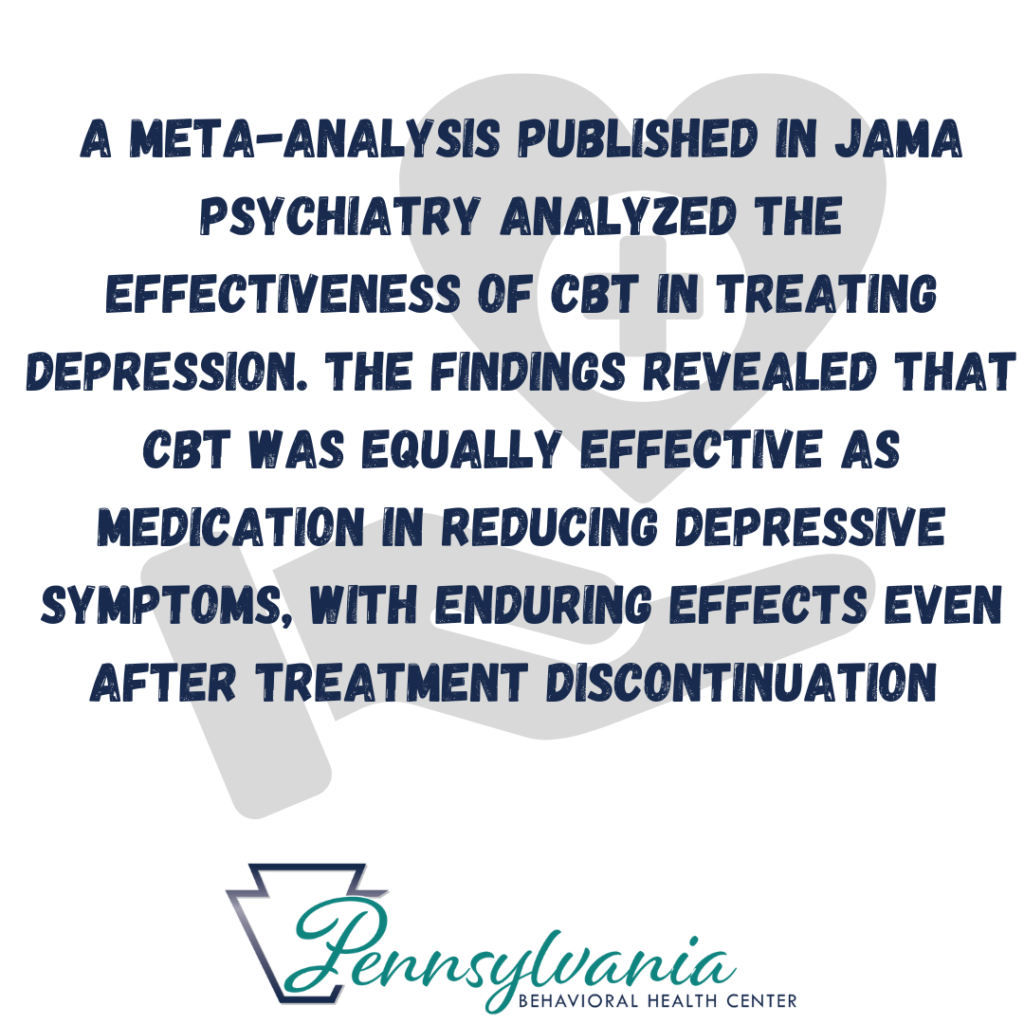Cognitive Behavioral Therapy (CBT) for Mental Health

Mental Health Treatment Cognitive Behavioral Therapy (CBT)
Welcome to Pennsylvania Behavioral Health Center, dedicated to providing valuable treatment like Cognitive Behavioral Therapy (CBT). CBT is a widely recognized and evidence-based therapeutic approach that empowers individuals to understand the connections between their thoughts, feelings, and behaviors. On this page, we will explore the principles, techniques, and benefits of CBT, supported by research findings from reputable sources.
What is Cognitive Behavioral Therapy (CBT)?
Cognitive Behavioral Therapy (CBT) is a form of psychotherapy that focuses on addressing the relationship between thoughts, emotions, and behaviors. Developed in the 1960s by Aaron T. Beck, CBT aims to identify and modify unhelpful patterns of thinking and behavior to alleviate emotional distress and promote psychological well-being. It is based on the premise that our thoughts and interpretations significantly influence our emotions and actions. It is an effective therapy for individuals who struggle with depression, anxiety, and trauma.
How does Cognitive Behavioral Therapy work?
CBT operates on the understanding that our thoughts, emotions, and behaviors are interconnected, forming a cycle that can perpetuate negative patterns. The therapy process typically involves the following steps:
Assessment: The therapist collaboratively works with the individual to assess their presenting concerns, identifying specific thoughts, emotions, and behaviors that contribute to their distress.
Cognitive Restructuring: This technique focuses on challenging and modifying irrational or negative thought patterns. By recognizing and replacing distorted thoughts with more accurate and balanced ones, individuals can experience a shift in their emotional and behavioral responses.
Behavioral Activation: CBT emphasizes the importance of engaging in adaptive behaviors that align with one’s goals and values. Through structured activities and behavioral experiments, individuals gradually increase their participation in rewarding and meaningful activities, fostering a sense of accomplishment and positive emotions.
Skills Training: CBT equips individuals with a range of coping skills and strategies to manage distressing emotions and challenging situations. These skills may include relaxation techniques, problem-solving skills, assertiveness training, and stress management strategies.
Homework and Practice: CBT encourages individuals to practice and apply the techniques learned in therapy sessions to real-life situations. Homework assignments serve as opportunities for individuals to reinforce new skills and perspectives, facilitating long-term change.
Why is Cognitive Behavioral Therapy effective?
Numerous research studies have demonstrated the effectiveness of CBT across a wide range of mental health conditions.
Here are a few examples:
A study published in the Journal of Consulting and Clinical Psychology found that CBT was effective in treating panic disorder, with significant reductions in panic attacks and improved overall functioning compared to a control group (Barlow, D. H., et al., 2000).
Another study published in JAMA Psychiatry examined the efficacy of CBT for social anxiety disorder. The results showed that CBT significantly reduced symptoms and improved social functioning compared to a control group (Hofmann, S. G., et al., 2013).
A meta-analysis published in JAMA Psychiatry analyzed the effectiveness of CBT in treating depression. The findings revealed that CBT was equally effective as medication in reducing depressive symptoms, with enduring effects even after treatment discontinuation (Cuijpers, P., et al., 2013).
These studies, along with numerous others, provide strong evidence for the effectiveness of CBT in addressing various mental health concerns.
Does health insurance cover Cognitive Behavioral Therapy (CBT)?
Health insurance coverage for Cognitive Behavioral Therapy (CBT) varies depending on the specific insurance provider and policy. Many insurance plans offer coverage for mental health services, including CBT, as part of their benefits package. However, the extent of coverage can vary, and it’s important to review the details of your insurance plan to determine the specifics. Some plans may require a referral from a primary care physician or pre-authorization for CBT sessions. It’s advisable to contact your insurance provider directly or consult with a mental health professional who can help you navigate the insurance process and understand the coverage available for CBT.
In conclusion, Cognitive Behavioral Therapy (CBT) is a highly effective therapeutic approach that focuses on the interplay between thoughts, emotions, and behaviors. By restructuring unhelpful thoughts, engaging in adaptive behaviors, and developing coping skills, individuals can experience significant improvements in their mental well-being. Research has consistently demonstrated the positive impact of CBT, making it a valuable tool for individuals seeking lasting change and improved quality of life.
If you would like to try Cognitive Behavioral Therapy for your mental health disorders or need help please call us at 610-563-2752.

